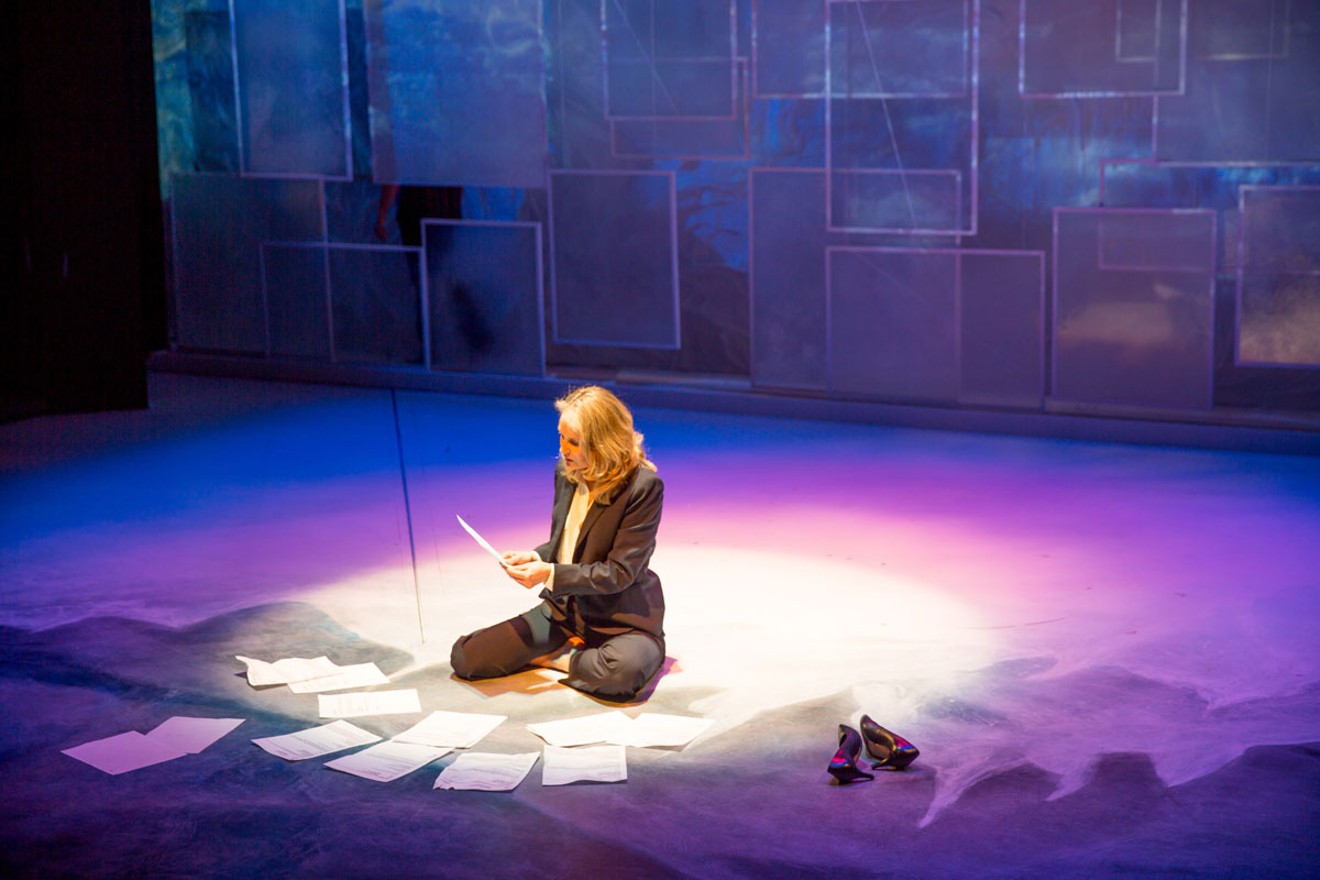At the request of Senator Louise Allen, paleoclimatologist Emma Phelps, an old friend, has come to Washington to testify on behalf of the Environmental Protection Agency before a congressional committee considering climate change. But the panel of experts is likely to be stacked against Phelps, with more oil-and-gas lobbyists and businesspeople than scientists. This is obviously a fertile and intensely relevant topic, but in Two Degrees — the title refers to the amount of warming the earth can tolerate before the consequences become catastrophic — playwright Tira Palmquist has married two dramatic strands, and the union is shaky.
Emma is a recent widow, and her grief over the danger to the planet is intertwined with her deep mourning for her dead husband, Jeffrey. The play begins with an affair she has in Washington — embarked on in distress and confusion, and in part to steady her nerves. Afterward, she meets with the senator’s chief of staff and gets a quick tutorial in the ways of the Capitol: No one will care about the reams of data she’s accumulated, she’s told, and she should reconsider what she’s wearing and not be seen drinking too much water. These scenes are intercut with flashbacks to loving, cuddly times with Jeffrey at their Boulder home. None of this is particularly original, though the affair does lead to an interesting plot twist. When Louise finally finds time in her stressful schedule for an intimate dinner with her old friend, there’s a second plot twist — but this one feels extraneous, unconvincing and unnecessary.
The high pitch of the national climate-change debate vibrates throughout the production, a world premiere at the Denver Center for the Performing Arts after the script was workshopped at last year’s Colorado New Play Summit (the 2017 edition runs February 24 through February 27). No one in the audience can be unaware that all of President Barack Obama’s work on the issue is about to be undone: that almost no sooner was Donald J. Trump elected president than a demand went out for the Energy Department to release the names of all scientists working on the issue, and that a climate-change denier who wants to abolish the agency itself has just been placed in charge of the EPA. For years, scientists have been trolled, threatened, forced to defend against lawsuits and had their e-mails hacked and stolen by deniers; much of this harassment was financed by organizations like the Koch brothers and Exxon Mobil, whose longtime CEO, Rex Tillerson, is now the country’s Secretary of State. In a play that Palmquist herself describes as “proudly political,” shouldn’t the script at least indicate that Emma is thinking about some of this on the eve of her crucial testimony? Instead, Two Degrees treads around political issues with great delicacy and caution, and Emma’s primary opponent in the committee presentation turns out to be a decent guy who’s sincerely concerned with the well-being of the people of Greenland, where she investigates ancient ice cores — and where his company wants to drill.
In the play’s final — and most successful — moments, Emma does describe her work, and then we glimpse the sheer majesty and beauty of the science itself, as well as the fierceness of her dedication. Jeffrey’s influence becomes clear too, and the plot strands wind satisfyingly together. This is also when Kathleen McCall finally comes into her own as Emma; otherwise, you never quite believe her interactions with any of these people. At least Jason Delane as D.C. fling Clay is dignified and strong, Robert Montano is a warmly appealing Jeffrey, and Kim Staunton’s Louise is a nice mix of tough and vulnerable.
Under the direction of Christy Montour-Larson, this production has both strengths and weaknesses. The tech, as is generally the case at the Denver Center, is stunning, dominated by a panel along the back of the stage that sometimes glows in an ethereal silver-blue, sometimes looks like sandstone-colored blocks bearing enigmatic carvings, and sometimes shows photographs or the screen of Emma’s laptop. But every now and then, the heretical thought popped up that this panel looked a bit like the tiling in a super-upscale bathroom. And while the coldness and flatness of the set and the sparsity of props and furniture do underline the icy brilliance of Emma’s work, they also tend to emphasize a cold flatness in the script.
Two Degrees, presented by the Denver Center for the Performing Arts Theatre Company through March 12, The Jones, Denver Performing Arts Complex, 303-893-4100, denvercenter.org.
[
{
"name": "Air - MediumRectangle - Inline Content - Mobile Display Size",
"component": "12017618",
"insertPoint": "2",
"requiredCountToDisplay": "2"
},{
"name": "Editor Picks",
"component": "17242653",
"insertPoint": "4",
"requiredCountToDisplay": "1"
},{
"name": "Inline Links",
"component": "18838239",
"insertPoint": "8th",
"startingPoint": 8,
"requiredCountToDisplay": "7",
"maxInsertions": 25
},{
"name": "Air - MediumRectangle - Combo - Inline Content",
"component": "17261320",
"insertPoint": "8th",
"startingPoint": 8,
"requiredCountToDisplay": "7",
"maxInsertions": 25
},{
"name": "Inline Links",
"component": "18838239",
"insertPoint": "8th",
"startingPoint": 12,
"requiredCountToDisplay": "11",
"maxInsertions": 25
},{
"name": "Air - Leaderboard Tower - Combo - Inline Content",
"component": "17261321",
"insertPoint": "8th",
"startingPoint": 12,
"requiredCountToDisplay": "11",
"maxInsertions": 25
}
]












